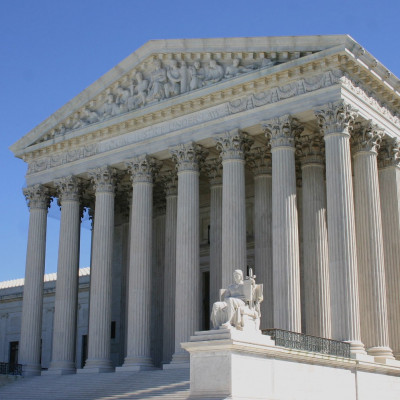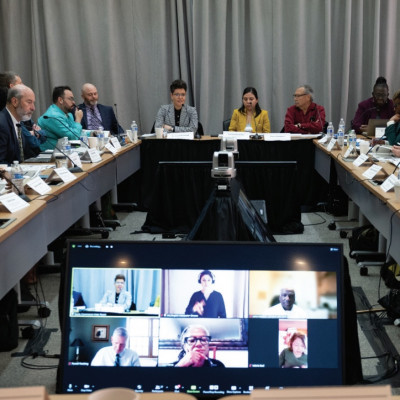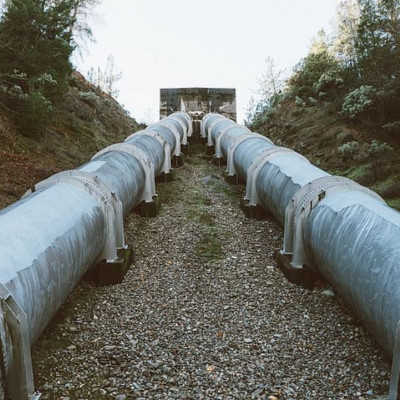January 31, 2024
January 2024 at Policy Integrity
- Are LNG Exports Worth the Climate Cost?
- Will SCOTUS Upend Chevron Deference?
- Feb 7th Webinar: Modeling the Energy Transition
- State Utility Commissions and Inclusive Decisionmaking
- How Can FERC Improve Gas Infrastructure Planning?
- Feb 28th: Food System Symposium
- More from This Month
-

Are LNG Exports Worth the Climate Cost?
The U.S. is the world’s largest exporter of liquified natural gas (LNG), but the Biden administration recently announced a temporary pause on all new approvals for LNG export until the Department of Energy can update its underlying analyses for authorizations. Our new report provides important data and useful insights for this update. In particular, we find that the gross climate costs associated with LNG exports are substantially higher than the estimated consumer welfare benefits. While the precise difference between costs and benefits depends on several factors and assumptions—including the share of gas production that displaces fossil-fuel production from other sources, the economic value assigned to climate damages, and the adoption of carbon-capture technology—our findings indicate that climate damages likely exceed consumer welfare benefits under a wide range of scenarios evaluated. At a minimum, our analysis supports DOE’s efforts to more closely scrutinize export applications.
-

Will SCOTUS Upend Chevron Deference?
On January 17th, the Supreme Court heard a pair of oral arguments in two cases that may change the landscape of administrative law. Loper Bright and Relentless both represent challenges to the Court’s long-standing and much-cited Chevron doctrine, which requires that courts defer to agencies’ reasonable interpretations of statutory silences and ambiguities. Our Don Goodson discussed the dynamics of the cases with Inside EPA. After the oral argument, Goodson noted that “a majority of justices in both cases appeared more than willing to eliminate Chevron deference.” As the Solicitor General explained in her Loper Bright brief, doing so would be “a convulsive shock to the legal system.” Yet “a majority of Justices did not seem particularly troubled by the fallout from overruling one of the most cited decisions in American history,” Goodson said.
-
_400_400_90_c1.jpeg)
Feb 7th Webinar: Modeling the Energy Transition
Policymakers focused on the energy transition must answer many difficult questions: How much electricity will we need in the future? Where will new clean power sources be located? How much will all of this cost? Modeling helps answer each of these questions, and researchers are constantly refining modeling approaches to get more accurate answers. Next Wednesday, we will host a webinar discussion with three such researchers and an official from FERC, the primary federal agency responsible for interstate grid planning. Panelists will share preliminary findings from their research and policy work, and address how models can help inform energy policy.
-

State Utility Commissions and Inclusive Decisionmaking
If you pay for electricity, or if you live near any sort of energy infrastructure, your life (and wallet) are affected by the decisions of a state public utility commission. These regulators make decisions that affect how much utilities can charge for electricity, and where and when new clean energy infrastructure will be built. While commission decisions are highly consequential, the underlying proceedings are technical and procedurally complex, making them difficult for much of the public to participate in – let alone influence. As a result, energy companies and groups with ample resources can play an outsized role in decisions. As we describe in our new report, many state commissions have some processes in place to overcome this lack of “procedural equity,” but there are considerable differences between states. While some states are more inclusive than others, Burçin Ünel and Elizabeth Stein point out in a recent article that “no one regulator [has] arrived at a definitive formula that other regulators could rely upon.” Rather, procedural equity is an evolving policy area where states can learn from one another and must further develop best practices.
-
How Can FERC Improve Gas Infrastructure Planning?
There are about three million miles of gas pipelines in the United States, and more continue to be proposed. But how do we know if a new pipeline is worth the cost, especially given that gas will eventually play less and less of a role in the energy system going forward? Our executive director, Burçin Ünel, and former legal fellow, Libby Dimenstein, analyze this infrastructure planning issue in their paper now published in the Columbia Law Review. They explain that FERC currently approves natural gas infrastructure using a ”pipeline-by-pipeline approach” in which it almost always greenlights projects when a “developer can demonstrate that there is a party willing to pay to use its pipeline.” This system doesn’t involve much planning at all, and it may result in unnecessary and expensive pipelines that ratepayers will have to pay for even if natural gas use declines as a result of the energy transition. Efforts to take these changes into account and to plan for “gas and electricity transmission in tandem” will help ensure rational and efficient planning in the future.
-

Feb 28th: Food System Symposium
The Institute for Policy Integrity is co-sponsoring a February event organized by the NYU Environmental Law Journal titled “Our Toxic Food System: Legal Perspectives on Pesticides and Pathways to Change.” Noted academics, policymakers, and advocates will discuss such issues as pesticides and environmental justice, regulation options, and potential solutions to make the food system more sustainable. Those who are interested can register to attend either in-person (NYU affiliates only) or via Zoom.
-
More from This Month
- We filed an amicus brief in an ongoing challenge to oil and gas permitting in Alaska.
- Our former legal fellow, Natasha Brunstein, published her article “Major Questions in Lower Courts” in the Administrative Law Review.

